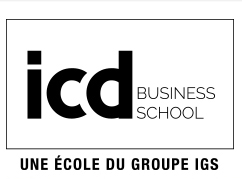
RESEARCH AT ICD
Research plays an active role in the academic excellence of the programmes taught at ICD. It provides inspiration, informs programmes, guarantees academic excellence and contributes to the development of business and management practice: research makes it possible for us to make progress in our teaching so that it meets contemporary academic and professional demands.

OUR STRATEGIC PROJECT
Sales and distribution professions are today facing a major paradigm shift resulting from three key transformations that are digital, ecological and managerial. Applied research occupies a crucial place among the priorities on which ICD is focusing in the pursuit of its development in order to respond to these changes.
APPLIED RESEARCH AT THE HEART OF ICD’S DEVELOPMENT INITIATIVES
The new research project, presented to the scientific advisory board in September 2020, aims to align our research activities with the school's positioning in order to participate in the emergence of high-tech innovations and to respond to the challenges facing society. It will be the research strategy for the next few years, in line with the content of our teaching programmes. The research team is thus pursuing its specialisation in the fields of business and distribution. The Faculty will continue to be strengthened in order to deepen our specialised themes allowing us to address contemporary issues that are changing the fundamentals of management sciences :
- The impact of digital technologies, Big Data and artificial intelligence
- Questions related to CSR, ethics and citizenship
- The emergence of new forms of work and management and entrepreneurship-intrapreneurship
By strengthening its applied research model in synergy with national and international business organisations and university partners, ICD’s LaRA Applied Research Laboratory is working on developing various collaborations.

INTERNATIONAL REACH
ICD is giving priority to offering the Faculty greater opportunities to participate in academic mobility programmes and to develop synergies at the European and international levels. It therefore intends to take advantage of the expertise of its professors and researchers to promote the work of LaRA. Existing collaborations have already been strengthened, in particular by the organisation of the first international conference in April 2020 with a strategic partner, JAMK University (Finland), on "Open Innovation, AI, Sales". This joint event should be pursued in Finland in 2022.
DEVELOPING OUR NATIONAL PARTNERSHIPS
It is also in France that ICD continues to strengthen its links via choice partnerships, mainly with research laboratories. A series of joint conferences on new management practices in the digital age will be held in 2020-2021 with DICEN. A similar approach is being developed in marketing with the LIRSA laboratory at the CNAM. François Silva, the director of research at ICD, and Kévin Pastier, a new professor, have already signed research articles in the name of the two institutions (ICD and DICEN-CNAM).
OUR AREAS OF RESEARH
3 PROFESSIONAL POLES & 4 TRANSVERSAL AREAS / PILLARS
| AREAS / PILLARS | DIGITAL CULTURE | ENTREPRENEURIAL / INTRAPRENEURIAL CULTURE | CIVIC CULTURE. CSR, SUSTAINABLE DEVELOPMENT, ETHICS, HUMANITIES | MANAGEMENT CULTURE & SKILLS |
| PROFESSIONAL POLES | MARKETING | |||
| SALES (incl. SUPPLY CHAIN MANAGEMENT / PURCHASING) | ||||
| SOCIAL ENTREPRENEURSHIP |
3 PROFESSIONAL POLES
- Marketing
- Sales
- Social Entrepreneurship
4 RESEARCH AREAS / PILLARS
Four main research areas have been identified for the new 2020-2025 research strategy. They cover the three main professions for which ICD prepares its students. Logically, they are the "research" counterpart of the school's new strategic and pedagogical project focused on societal topics and themes.
- "Digital, Big Data and Artificial Intelligence" culture aims to explore and understand the consequences and transformations of the deepening and pervasiveness of digital culture in relation to Big Data and AI.
- "CSR, ethics and citizenship" culture focuses on circular, social or solidarity economies which are today new alternatives to the traditional business organisation. The latter, as well as management, must be transformed to meet the new socio-environmental, ethical and civic challenges they face.
- "New management and work practices" culture takes the two previous themes further, in order to understand the new forms of emerging organisation (social economy, agile and liberated management, collaboration and work communities, collaborative and digital work, etc.).
- "Social Entrepreneurship" culture, in parallel with the creation of a new teaching module, seeks to respond to the questions emerging around this theme, and which is very much in demand from students.



